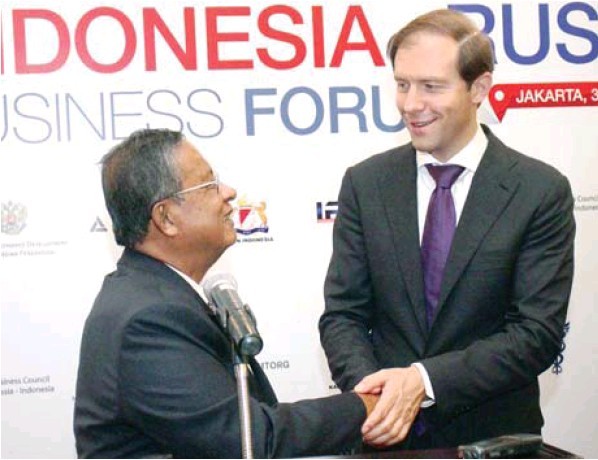Popular Reads
Top Results
Can't find what you're looking for?
View all search resultsPopular Reads
Top Results
Can't find what you're looking for?
View all search resultsIndonesia explores bid to forge FTA with Eurasian Union
Change text size
Gift Premium Articles
to Anyone
 Indo-Russia partnership: Russian Trade and Industry Minister Dennis Manturov (right) talks to Indonesian Coordinating Economic Minister Darmin Nasution at their joint press conference following the 11th Russian-Indonesian Joint Commission on Trade, Economic and Technical Cooperation in Jakarta on Monday. (JP/Dana Wardhana)
Indo-Russia partnership: Russian Trade and Industry Minister Dennis Manturov (right) talks to Indonesian Coordinating Economic Minister Darmin Nasution at their joint press conference following the 11th Russian-Indonesian Joint Commission on Trade, Economic and Technical Cooperation in Jakarta on Monday. (JP/Dana Wardhana)
R
ussia’s trade diplomacy has enticed Indonesia into exploring the possibility of forging a free trade agreement (FTA) with the Russia-led Eurasian Economic Union (EEU) alongside a raft of cooperative agreements in the development of sophisticated equipment.
Visiting Russian Trade and Industry Minister Denis Manturov met Coordinating Economic Minister Darmin Nasution on Monday to find ways of maximizing the two nations’ resources to increase bilateral trade.
Darmin said there was a possibility for Indonesia to strike a deal with the EEU as encouraged by Russian President Vladimir Putin with President Joko “Jokowi” Widodo during the latter’s visit to Sochi in May for the ASEAN-Russia Summit.
“Indonesia has agreed to conduct studies with Russia before applying to forge an FTA with the EEU,” said Darmin.
Aside from Russia, EEU members include Armenia, Belarus, Kazakhstan and Kyrgyzstan with an integrated market access to 183 million people.
Among the 10 ASEAN countries, only Vietnam has an FTA with the EEU, signed this year. Vietnam announced in the middle of last year that the two sides had completed procedures and the agreement would take effect from Oct. 5 of this year.
Singapore is also in the process of applying for a deal.
Indonesia and Russia have targeted bilateral trade to reach US$5 billion this year.
“I cannot predict if we can reach that [$5 billion] target this year but we’re not losing hope,” Manturov said.
“We are opening new opportunities for trade and investment,” he said after attending the 11th Russian-Indonesian Joint Commission on Trade, Economic and Technical Cooperation on Monday.
The 10th joint commission meeting last year set a target of $5 billion to be achieved this year. However, data from Indonesia’s Trade Ministry shows that for the period of January-July this year, trade dropped by 4.15 percent year-on-year to $1.07 billion.
Russia hopes the recent easing of access for Indonesia’s products can help to bolster trade.
Russia has withdrawn its ban on fish imports from Indonesia and eased import procedures for Indonesia’s crude palm oil (CPO). Indonesia is Russia’s biggest CPO supplier.
The archipelago, on the other hand, has withdrawn a plan to slap an anti-dumping policy on Russia’s steel products in the form of hot rolled coil and cold rolled coil.
It is hoped that the withdrawal will increase Russia’s exports as the metal trade has been a major dragger in its export performance over the past three years.
Data from the Geneva-based International Trade Center shows total trade between the two countries declined from $2.1 billion in 2013 to $1.4 billion last year with Indonesia booking a surplus of $554.3 million.
Despite the sober trade performance, Russia has won several lucrative projects in Indonesia, such as the construction of an $13.8 billion refinery in East Java between staterun oil and gas operator Pertamina and the Rosneft Oil Company.
Aside from trade issues, Darmin and Manturov also witnessed the signing of an MoU between Rusnano, Russia’s state-run firm for commercializing developments in nanotechnology, and PT Wijaya Infrastruktur Indonesia.
The two companies will cooperate in the development of telecommunications satellites, aircraft, helicopters and wireless telecommunications system.
An MoU has also been signed between the Russian Agency for Export Credit and Investment Insurance (EXIAR) and state-run PT Asuransi ASEI on reinsurance agreements on trade.









